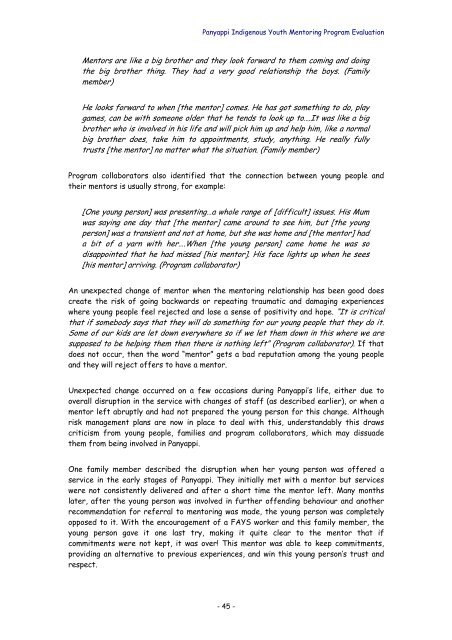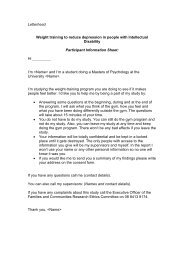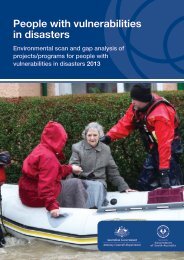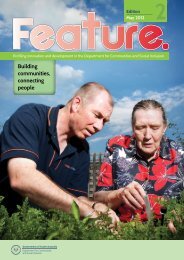Panyappi Indigenous Youth Mentoring Program Evaluation
Panyappi Indigenous Youth Mentoring Program Evaluation
Panyappi Indigenous Youth Mentoring Program Evaluation
Create successful ePaper yourself
Turn your PDF publications into a flip-book with our unique Google optimized e-Paper software.
<strong>Panyappi</strong> <strong>Indigenous</strong> <strong>Youth</strong> <strong>Mentoring</strong> <strong>Program</strong> <strong>Evaluation</strong><br />
Mentors are like a big brother and they look forward to them coming and doing<br />
the big brother thing. They had a very good relationship the boys. (Family<br />
member)<br />
He looks forward to when [the mentor ] comes. He has got something to do, play<br />
games, can be with someone older that he tends to look up to….It was like a big<br />
brother who is involved in his life and will pick him up and help him, like a normal<br />
big brother does, take him to appointments, study, anything. He really fully<br />
trusts [the mentor] no matter what the situation. (Family member)<br />
<strong>Program</strong> collaborators also identified that the connection between young people and<br />
their mentors is usually strong, for example:<br />
[One young person] was presenting…a whole range of [difficult] issues. His Mum<br />
was saying one day that [the mentor] came around to see him, but [the young<br />
person] was a transient and not at home, but she was home and [the mentor] had<br />
a bit of a yarn with her….When [the young person] came home he was so<br />
disappointed that he had mi ssed [his mentor] . His face lights up when he sees<br />
[his mentor] arriving. (<strong>Program</strong> collaborator)<br />
An unexpected change of mentor when the mentoring relationship has been good does<br />
create the risk of going backwards or repeating traumatic and damaging experiences<br />
where young people feel rejected and lose a sense of positivity and hope. “ I t is critical<br />
that if somebody says that they will do something for our young people that they do it.<br />
Some of our kids are let down everywhere so if we let them down in this where we are<br />
supposed to be helping them then there is nothing left” (<strong>Program</strong> collaborator). If that<br />
does not occur, then the word “mentor” gets a bad reputation among the young people<br />
and they will reject offers to have a mentor.<br />
Unexpected change occurred on a few occasions during <strong>Panyappi</strong>’s life, either due to<br />
overall disruption in the service with changes of staff (as described earlier), or when a<br />
mentor left abruptly and had not prepared the young person for this change. Although<br />
risk management plans are now in place to deal with this, understandably this draws<br />
criticism from young people, families and program collaborators, which may dissuade<br />
them from being involved in <strong>Panyappi</strong>.<br />
One family member described the disruption when her young person was offered a<br />
service in the early stages of <strong>Panyappi</strong>. They initially met with a mentor but services<br />
were not consistently delivered and after a short time the mentor left. Many months<br />
later, after the young person was involved in further offending behaviour and another<br />
recommendation for referral to mentoring was made, the young person was completely<br />
opposed to it. With the encouragement of a FAYS worker and this family member, the<br />
young person gave it one last try, making it quite clear to the mentor that if<br />
commitments were not kept, it was over! This mentor was able to keep commitments,<br />
providing an alternative to previous experiences, and win this young person’s trust and<br />
respect.<br />
- 45 -












